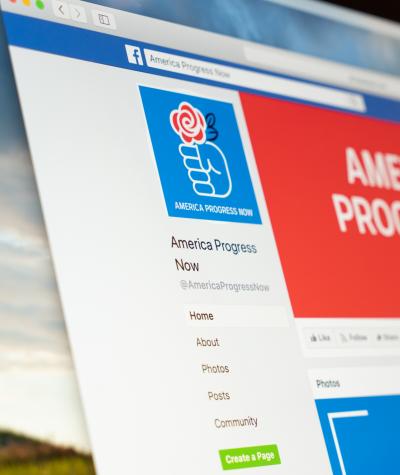In the final weeks of the 2018 elections, a Facebook page called America Progress Now was created and quickly reached hundreds of thousands of Facebook users with paid ads urging voters to cast ballots for third-party candidates in five competitive U.S. Senate and House races. Shortly after Election Day, the page went silent.
America Progress Now should have reported its spending to the Federal Election Commission (FEC), since the ads fell into that narrow category of digital political ads subject to federal disclosure requirements. But it didn’t report anything.
Nor did the ads display accurate legally-required disclaimers. Despite the ads stating they were “paid for by America Progress Now,” America Progress Now does not appear to actually exist, ProPublica and Vice News reported.
The group does not appear in corporate records, it does not appear to have a website, and the Bronx street address briefly listed on its Facebook page showed no record of the entity’s existence.
As a result, nearly a year after the 2018 election, voters still do not know whether America Progress Now was the work of a third party supporter in New York, or of a major party political operative promoting spoiler candidates in swing states, or of a foreign government seeking to exploit U.S. political divisions.
Campaign Legal Center (CLC) has filed a complaint with the FEC alleging violations of federal campaign finance law.
But the America Progress Now example also illustrates the limitations of Facebook’s self-regulatory measures.
Facebook has begun to require that political ads include a disclaimer stating who paid for them, but has allowed advertisers to fill in the disclaimer field with whatever made-up name they choose—like America Progress Now.
For 2020, Facebook has announced that political advertisers who provide an FEC identification number will get a “confirmed organization” tag, but a page that fails to provide an FEC ID can still run political ads, as long as it has a website and email address (and it is very easy to set up a website).
Facebook has made no indication that it will independently verify whether an entity has actually reported its digital ad expenditures to the FEC.
Facebook also recently announced that, “[i]f we are made aware of an ad that is in violation of a law, we will act quickly to remove it.” But how Facebook will implement this pledge remains to be seen.
CLC’s FEC complaint documents how the America Progress Now ads violated the law by using a fake name on disclaimers, and by failing to report spending.
But if Facebook is waiting for the FEC to say that an ad is in violation of the law, it is going to be waiting for a while: the agency currently lacks the quorum necessary to resolve complaints, and even with a full slate of Commissioners, the FEC can take years to close a case. Facebook removing an illegal ad years after an election has passed will have little effect.
Ideally, a functioning FEC could send a clear signal—both to political actors and to platforms like Facebook—in advance of the 2020 elections that federal law’s disclaimer and disclosure requirements apply to digital independent expenditures.
But in the absence of an effective FEC, it remains to be seen how Facebook will handle ads from a group like America Progress Now in 2020.
